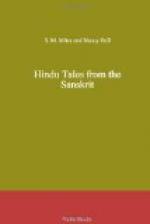“What we must do now is to take this horrible net to my old friend Hiranya the mouse, who will, I am quite sure, nibble through the strings for me and set us all free. He lives, as you all know, near the tree where the net was spread, deep underground; but there are many passages leading to his home, and we shall easily find one of the openings. Once there, we will all lift up our voices, and call to him at once, when he will be sure to hear us.” So the weary pigeons took up their burden once more, and sped back whence they had come, greatly to the surprise of the crow, who wondered at their coming back to the very place where misfortune had overtaken them. He very soon learnt the reason, and got so excited watching what was going on, that he hopped out of his nest and perched upon a branch where he could see better. Presently a great clamour arose, one word being repeated again and again: “Hiranya! Hiranya! Hiranya.”
“Why, that’s the name of the mouse who lives down below there!” thought the crow. “Now, what good can he do? I know, I know,” he added, as he remembered the sharp teeth of Hiranya. “That king of the pigeons is a sensible fellow. I must make friends with him.”
Very soon, as the pigeons lay fluttering and struggling outside one of the entrances to Hiranya’s retreat, the mouse came out. He didn’t even need to be told what was wanted, but at once began to nibble the string, first setting free the king, and then all the rest of the birds. “A friend in need is a friend indeed,” cried the king; “a thousand thousand thanks!” And away he flew up into the beautiful free air of heaven, followed by the happy pigeons, none of them ever likely to forget the adventure or to pick up food from the ground without a good look at it first.
3. What was the chief virtue displayed by the mouse on this occasion?
4. Do you think it is easier to obey than to command?
CHAPTER III
The mouse did not at once return to his hole when the birds were gone, but went for a little stroll, which brought him to the ground still strewn with rice, which he began to eat with great relish. “It’s an ill wind,” he said to himself, “which brings nobody any good. There’s many a good meal for my whole family here.”
Presently he was joined by the old crow, who had flown down from his perch unnoticed by Hiranya, and now addressed him in his croaky voice:
“Hiranya,” he said, “for that I know is your name, I am called Laghupatin and I would gladly have you for a friend. I have seen all that you did for the pigeons, and have come to the conclusion that you are a mouse of great wisdom, ready to help those who are in trouble, without any thought of yourself.”
“You are quite wrong,” squeaked Hiranya. “I am not so silly as you make out. I have no wish to be your friend. If you were hungry, you wouldn’t hesitate to gobble me up. I don’t care for that sort of affection.”




